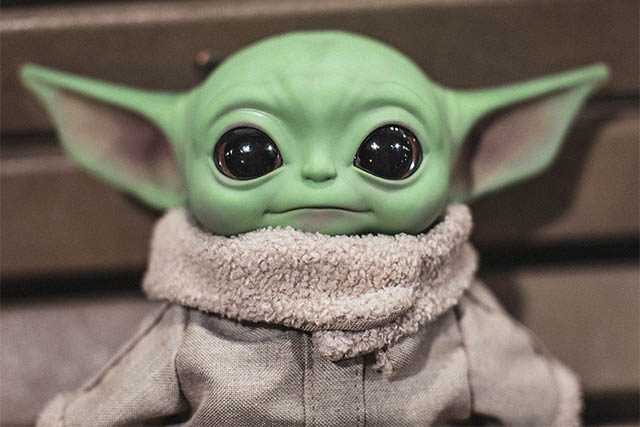Note: The following article contains spoilers about “The Mandalorian, Season 2.”
Names have always played an important role in the Star Wars universe. Names like Chewbacca, Wedge Antilles or Bib Fortuna are all otherworldly, and yet somehow they sound perfectly plausible. Star Wars names are also often perfect matches for the character. It’s hard to imagine someone named Jabba the Hutt as a slim athlete, or a person named Darth Vader giving gifts to kids on Christmas Eve.
Very recently, another name was added to the Star Wars canon: Grogu. This was revealed to be the name for the character previously only referred to as The Child or Baby Yoda, in the latest Star Wars series, The Mandalorian. As with anything related to Star Wars, the name sparked controversy online: some people loved it, some people hated it.
This brings up the interesting question of how a name can fit a character at all? How can sounds be a good or a bad match for a person?
This is something I’ve studied for several years now. The phenomenon of sound symbolism refers to the finding that people will indeed associate certain characteristics to certain sounds. For example, when given the options bouba and kiki, roughly 90 per cent of people around the world say bouba is a better word for something round, and kiki is a better word for something spiky.
But it goes beyond shape. People will associate different sizes, colours and even personalities to different words based on their sounds. And, importantly, they will also do this for names.
So what sorts of things will people associate with a name like Grogu? And are they fitting for Baby Yoda?
The shape and size of Grogu
Grogu’s most prominent features are his round head and eyes. Does the name fit his shape? Yes! In general, people will associate voiced stops (pronounced with vibrating vocal cords), like /g/, with round things. Even stronger is the association between rounded vowels, like /o/ and /u/, and round things. One explanation for this has to do with the rounded shape of the lips while pronouncing these vowels.
But we can be even more definitive. In 2018, three other researchers and I conducted a study in which we had people make judgments on 8,000 non-words. For example, we asked if gragwom would be considered a good word for something round. Unfortunately, grogu wasn’t one of them. But based on all of those responses, we can extrapolate that there’s a 70 per cent chance a person would say Grogu is a good word for something round.
In another study, my co-author and I went beyond shape and asked if some personality traits are metaphorically round. Indeed, we found that traits like easygoingness or introversion were considered “round traits,” while aggressiveness or harshness were considered “spiky traits.” Importantly, participants said that round-sounding names were better matches for the round traits. So not only is Grogu a good name for a round person, but also a person with an easygoing and introverted personality.
However, it seems that when coming up with the name, size mattered not, because Grogu is not a small-sounding word. Voiced stops like /g/ are associated with larger sizes, as are vowels pronounced with the tongue toward the back of the mouth — like /o/ or /u/.
One explanation is that these are evolved associations. All of these sounds have a relatively lower pitch, which is the sound that larger animals tend to make.
Regarding Grogu, our data would actually predict a 69.85 per cent chance a person would say Grogu is a good word for something large.
That being said, you might be left with the feeling that there is still something baby-like about the name Grogu. That might come from the /u/ sound at the end. Some of the first sounds that infants produce are cooing sounds like oo or even goo.
The color of Grogu
Colour associations are a bit less straightforward than shape or size. There is evidence that back vowels (like /o/ or /u/) are associated with darker colors. But there is less evidence linking sounds with particular hues. What evidence there is would suggest vowels pronounced with the tongue high and front in the mouth — like the “ee” sound in See-Threepio (C-3PO) — are actually the ones associated with green.
But it’s worth mentioning that words for green in many languages can be traced back to words related to plants. For example, green traces back to a word related to growth. So, while it’s admittedly a stretch, there is something appropriate in the name for a green character containing the word grow.
Grogu and English
How does Grogu fit in with English words? The onset gr- is a phonestheme in English — a sound sequence that tends to occur in words with similar meanings. In particular, gr- tends to show up at the start of words related to unpleasantness or complaints, like grim, grumpy or grumble. Not so appropriate for good-natured Grogu!
Another fact is that it’s rare for an English word to end with a consonant followed by the letter “u” — words that do are typically borrowed from other languages, like haiku or guru. It’s also uncommon for North American names to end in “u.” Of the 1,000 most popular baby names for boys in the U.S. in 2019, only three ended in “u” — Beau (132nd), Keanu (630th) and Tru (926th). And Beau rhymes with doe, so technically only Keanu and Tru count here. This might actually work for Grogu, and help make the name feel more unfamiliar.
The verdict?
Grogu is a decent name for Baby Yoda. It’s a good name for someone round and easygoing, it ends in a baby-like sound and it has a decidedly non-English spelling.
But what if fans wanted something a little more suitable? I looked through our 8,000 non-words for one that would be judged a good match for something round, small and spiritual. The best option? Melion (MEL-EE-UN). I’ll leave it to the comments section to decide if that’s better than Grogu, but I think Melion and The Mandalorian has a nice ring to it!![]()
David Sidhu, Postdoctoral Research Fellow, Psychology and Language Sciences, UCL. This article is republished from The Conversation under a Creative Commons license. Read the original article.










